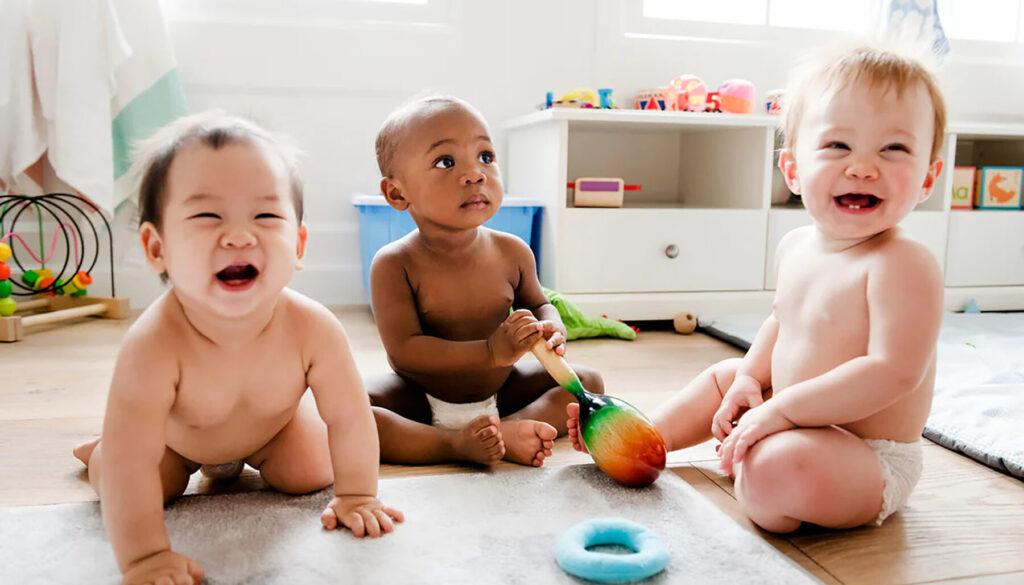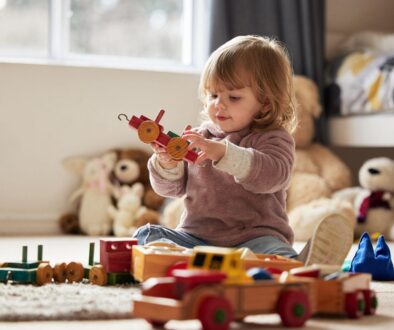Things To Know About Development During the First Two Years

Development during the first two years of a child’s life is a critical period characterized by rapid growth and learning. It’s important to remember that each child develops at their own pace. While there are general developmental milestones, there is a wide range of normal variation. Some children might reach certain milestones earlier, while others might take a little longer.
Here are some important things to know about this stage of development:
Physical Growth and Motor Skills– During the first two years, babies experience significant physical growth and go through major milestones in motor development. They start by lifting their heads, rolling over, sitting up, crawling, and eventually walking. Motor skills develop in a predictable sequence, but there can be variations in the timing. Like babies, toddlers come in all shapes and sizes. Your doctor will continue to plot your little one’s growth on a growth chart during regular checkups. Although you may be concerned that your child is too little or too big at any one time, the most important thing is that your child continues to grow at a steady rate.
- Remember to create a supportive and encouraging environment to strengthen physical development. Tummy time is crucial for building neck and upper body strength. As your baby grows, encourage them to reach for objects and grasp them. Ensure that your home is baby-proofed and safe for exploration. Give your little ones plenty of room to roll, crawl, and play and plenty of safe objects nearby to practice grasping, grabbing, shaking, and placing in their mouths.
Social and Emotional Development– Babies form strong emotional bonds with their caregivers, typically parents, during these years. Attachment is a central aspect of development, and a secure attachment contributes to healthy emotional development later in life. Babies also begin to show basic emotions like happiness, anger, and fear.
- Some ways to help nurture your baby’s social and emotional skills include responding promptly and warmly to your baby’s cues. This builds trust and helps them feel secure, which is the foundation for healthy social and emotional development. Develop a strong bond with your baby through cuddling, holding, and skin-to-skin contact. This attachment provides a sense of security that influences their future relationships.
Sensory Development– Infants are born with immature sensory systems that rapidly develop during the first two years. Their vision, hearing, taste, smell, and touch senses improve, enabling them to interact more with their environment.
- Introduce a variety of textures for your baby to touch and feel. You can use soft fabrics, textured toys, and objects with different surfaces. Use high-contrast patterns and colors to catch your baby’s attention. Mobiles with contrasting shapes and colors can be particularly engaging for newborns. Play soothing music, sing lullabies, and introduce your baby to different sounds in their environment and provide sensory-rich play experiences like water play, finger painting with safe non-toxic materials, and sensory bins filled with materials like rice, beans, or sand.
Cognitive Development and Language Acquisition– Cognitive development involves learning, memory, problem-solving, and thinking skills. Infants show curiosity and begin to explore objects around them. They develop object permanence, the understanding that objects continue to exist even when out of sight. Language development is remarkable during this period. Babies start by cooing, babbling, and imitating sounds. They progress to using single words and then simple sentences. Caregivers play a crucial role in supporting language development through interaction and exposure to language.
- It’s important to engage little ones in conversations right from birth. Describe what you’re doing, name objects, and respond to their vocalizations. Read age-appropriate books. Choose books with colorful pictures and simple stories to foster a love for reading and language development.
Sleep Patterns– Sleep patterns can vary widely among infants. Newborns sleep a lot, with irregular sleep-wake cycles. By around 3-4 months, they start to develop more regular sleep patterns, including longer nighttime sleep.
- Create a consistent bedtime routine that includes calming activities like bathing, reading, or gentle rocking. Following the same routine every night signals to your baby that it’s time to wind down and sleep. Learn to recognize your baby’s sleep cues such as rubbing their eyes, yawning, or becoming fussy and create a comfortable and safe sleep environment.
Nutrition and Feeding– Nutrition is critical for healthy growth and development. Infants are typically breastfed or bottle-fed during their first year, and solid foods are introduced around 6 months. Proper nutrition is essential for brain development and overall health.
- For newborns, breastfeeding or formula is recommended as the primary source of nutrition. Consult your pediatrician to determine when your baby is ready to start solid foods and what foods to begin with.
Health and Safety– Regular check-ups with a pediatrician are important to monitor growth and development. Childproofing the environment and ensuring a safe space for exploration is crucial.
- Remember that while it’s important to ensure your baby’s safety and health, parenting comes with challenges and learning experiences. Trust your instincts, stay informed, and reach out to healthcare professionals when needed.
Parents and caregivers play a fundamental role in a child’s early development. Responsive caregiving, interaction, and engagement are vital for fostering healthy attachments and promoting various aspects of development. Every child is unique, and development can vary widely. If you have concerns about your child’s development, consult with a pediatrician or child development specialist for guidance and support.





